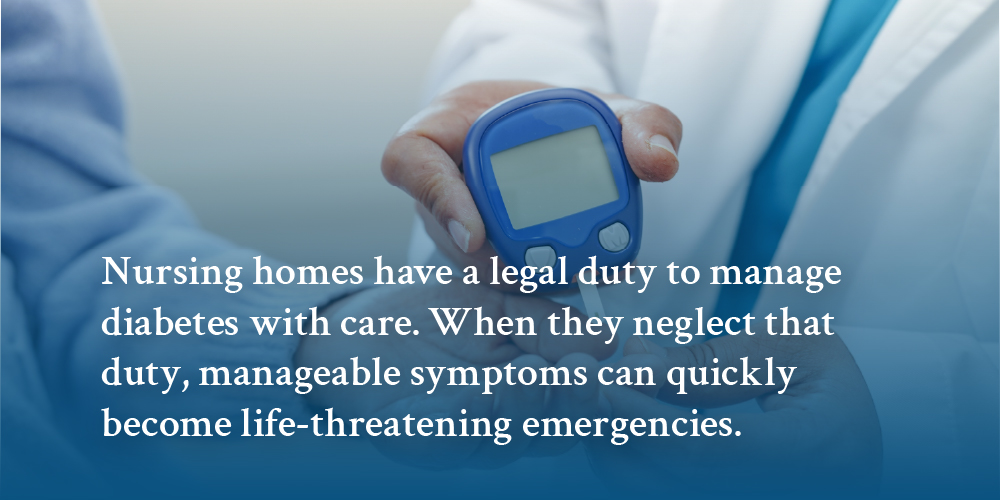
If your parent or loved one has diabetes and lives in a nursing home, you might naturally worry about whether they are getting the right care. Diabetes requires daily attention. This means monitoring, proper diet, medication, and communication between caregivers and doctors. When that care slips, the results can be tragic.
Poor diabetes management in a nursing home can lead to serious conditions and even death. Unfortunately, neglect in this area is more common than many families realize. By learning the warning signs of unmanaged diabetes, you can better protect your parent’s health and hold negligent nursing homes accountable. Our Peoria, IL nursing home injury neglect attorneys are here to help.
What Should Nursing Homes Do for Residents with Diabetes?
Diabetes is one of the most common chronic conditions among nursing home residents. It affects how the body processes blood sugar. If left uncontrolled, it can damage nearly every major organ. For elderly residents, poor diabetes management can quickly spiral into a medical emergency.
At a minimum, a nursing home must provide regular blood sugar checks and proper administration of insulin or other medications. There should be constant monitoring for symptoms of high or low blood sugar. In addition, every resident should be given a balanced diet appropriate for diabetes. When readings are abnormal or there are any changes to a resident’s health, a resident needs to see a doctor right away.
Under Illinois law, nursing homes are required to meet residents’ medical needs according to their individualized care plans. The Illinois Nursing Home Care Act (210 ILCS 45/) makes it clear that nursing homes are responsible for medical treatment and supervision for diabetes. If a nursing home does not meet these obligations, it can be held legally responsible for any resulting injuries or death.
What Happens When Diabetes Is Not Managed Correctly in Elderly Nursing Home Patients?
When nursing home staff do not manage a patient’s diabetes, it can be life-threatening. Both hyperglycemia (high blood sugar) and hypoglycemia (low blood sugar) can cause serious complications within hours or days if untreated.
Common complications include:
- Diabetic ketoacidosis (DKA): A dangerous buildup of acid in the blood caused by prolonged high blood sugar.
- Hypoglycemic shock: When blood sugar drops too low, leading to confusion, seizures, or loss of consciousness.
- Infections: High blood sugar weakens the immune system, making residents more likely to develop infections such as urinary tract infections, pneumonia, or sepsis.
- Slow healing: Cuts, sores, or ulcers may become infected and lead to amputation.
- Kidney failure, heart attack, or stroke: Long-term neglect can permanently damage vital organs.
- Death: Severe complications from unmanaged diabetes can be fatal, especially for elderly residents with other health conditions.
In many nursing home neglect cases, these outcomes could have been prevented with better care.
Signs That a Nursing Home Is Not Managing Diabetes Properly
It can be hard to know if a nursing home is taking good care of your loved one. Many residents cannot recognize or explain when something is wrong. That is why it is important for family members to pay close attention to signs of poor diabetes management.
Watch for changes in your parent’s body or behavior. Sudden weight loss or weight gain can be a red flag. Constant thirst, frequent urination, or extreme tiredness may also point to high or low blood sugar levels. You might notice confusion, mood swings, or dizziness. Slow-healing wounds can be another sign that diabetes is not being controlled properly. A sweet or fruity smell on the breath may mean a serious condition called ketoacidosis, which needs immediate medical care.
You should also look for warning signs of neglect by the staff or facility. If medication times are missed or inconsistent, or if there are no records showing regular blood sugar checks, that is concerning. Staff should always be able to explain your parent’s care plan and recent glucose readings.
Pay attention to the environment, too. Dirty rooms, bad meals, or delays in getting medical help can show that the nursing home is not doing its job. Frequent infections or repeated hospital visits without clear reasons may also point to neglect.
If you notice any of these problems, take action right away. Ask questions, request copies of medical records, and speak directly with supervisors or administrators. Your loved one depends on you to make sure they are getting the care they deserve.
What to Do If You Suspect Neglect
If you believe your parent’s diabetes is not being managed properly, you should act quickly. Start by getting copies of the resident’s care plan, medication logs, and recent medical records. If the facility will not give them to you, that may be a red flag that they are hiding neglect.
Next, schedule a meeting with the facility administrator or director of nursing. Ask specific questions. How often are blood sugar levels checked? Who gives your parent insulin, and what training do they have? What happens if blood sugar levels are dangerously high or low? When was the last time the resident’s physician reviewed their diabetes plan?
If the answers are vague or inconsistent, you may be dealing with negligence. You should consider contacting an experienced Peoria nursing home injury lawyer who can investigate further. An attorney can ask for additional records, speak with medical experts, and find out whether the facility violated Illinois nursing home regulations.
If a nursing home’s negligence leads to illness, hospitalization, or death, families can pursue a personal injury or wrongful death claim under Illinois law.

Call a Peoria, IL Nursing Home Injury Lawyer Today
If your parent or loved one has suffered because their nursing home did not manage their diabetes, you have options. The Peoria County nursing home neglect attorneys at Nursing Home Injury Center fight to hold negligent facilities accountable and recover the compensation your family deserves.
Our firm offers free consultations and handles all cases on a contingency fee basis, meaning you do not pay unless we win. To talk to an experienced nursing home injury lawyer, call 309-524-6900 today. Protect your loved one’s health, dignity, and future.



